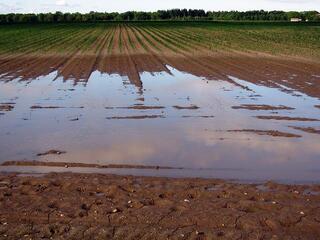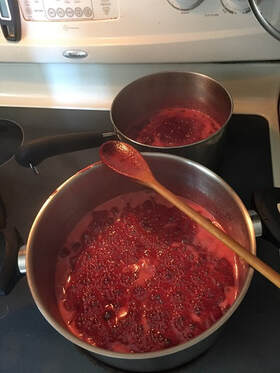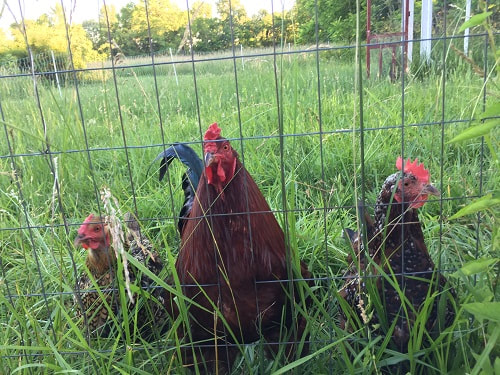 Not our property, but all the fields around us look like this...
Not our property, but all the fields around us look like this... While it's easy to see signs of the climate becoming more unstable and unpredictable over the past few decades, these past few years it has been especially obvious. (I like to say, if you garden, you can't not believe in climate change!) From the extremes in temperatures over the past few years, to the incredible variation in precipitation and severe weather events across the country, it's clear that things are trending in a more extreme direction.
This year so far in Ohio, we have been treated to an extra warm and early spring, ridiculous amounts of rain (we're only halfway through June and have already had nearly 7" this month, on top of the 4" we got the last week of May), and now, extremely unseasonal heat for two weeks in a row, with temperatures nearing 100 degrees for multiple days in a row (yes, in the first half of June!).
Needless to say, this is all extremely confusing and challenging to both the garden and the livestock.
Growing a large organic garden always has its challenges, but extreme weather events add another level of difficulty to the mix. Along with pests (this year it has been mainly voles and ground squirrels that we've had to contend with), weeds, and the occasional fungus, we have had to deal with nearly constant rain.
I have been especially grateful for the hay bale portion of our garden this year. The tomato plants and potatoes that I have planted in hay bales are worlds apart from those planted in the ground. While the hay bale plants are huge, vibrant, bushy, green, and blooming, the potatoes planted in the soil beds hardly came up at all because so many of them rotted in the ground. The tomatoes that are planted in soil barely grew at all for the first 3 weeks, and are just now starting to pull through, but still looking yellow, stunted, and sickly (despite being big, beautiful, well-established seedlings when I planted them out).
The ground cherries look similar, and the peppers are not much better. My corn bed looks like a mossy swamp, and I believe much of my corn seed rotted in the ground before it could come up, as I barely have any plants. (I plan to try re-planting some more this weekend - hopefully it's not too late...)
There are a few crops (shallow-rooted ones like onions and shallots and peas) that are doing well, but most are basically drowning because the ground is so wet. I like to keep the soil well mulched to prevent blight and soil-borne diseases and reduce weeding chores, but this year it is a bit of a conundrum, as I feel like the mulch is just keeping the soil wetter underneath...
Most years, I am grateful and happy for summer rain, especially when it's so hot. It feels strange to be hoping and praying for it NOT to rain! I am unsure whether I should go to the effort of laying out my irrigation lines - will I need them, or not? It's impossible to tell, so I opted to get them out this weekend, although I'm not putting them on all the beds this year - only the crops that need the most water.
Along with all the rain comes WEEDS, of which there are plenty, although our garden is now well-enough established that it's not as onerous a task as it might otherwise be. And I expect the tomato blight will be bad this year, especially for the weakened plants in the soil beds.
We've also had some heavy storms with extremely strong winds (which thankfully didn't cause too much damage since most of the plants are still small), but so far, we've been lucky enough to avoid the hail which some areas have experienced.
And the plants are also confused by the temperature changes - going from 97 degrees two days ago to 48 degrees tonight is a big drop to adjust to!
So far, it has been a roller coaster of a summer, and I'm wondering what the rest of the season will be like...
Raising Livestock In A Changing Climate
But the plants aren't the only things that suffer when we have extreme weather.
While the chickens don't care so much about the rain (actually, they love digging in the mud looking for worms, and insist on digging big, gross mud puddles in the chicken run despite my best efforts to fill them in with fresh wood chips), the temperature is another matter.
| I was silly enough to think that cold weather breeds would be appropriate for Central Ohio (what was I thinking?!), so most of our chickens are heavily feathered, with short combs and wattles. This makes it very hard for them to deal with extreme heat and humidity, and they spend most of the day standing in the shade with their wings spread and beaks open, panting constantly. I made them a dust bath with cool sand in the shade under the coop, which they use frequently, and have been giving them "ice tea" in the morning before leaving for work. (Ice water with a big handful of fresh mint and some electrolytes added.) |
Even the cat runs for shade on days like we've had lately, and he is losing fur like crazy, so I think his body is trying to adjust to the sudden heat... (Unfortunately, he seems to have lost his taste for hunting as well with the hot weather.)
 Making jam - 2 kinds!
Making jam - 2 kinds! I will admit that the effects of climate change aren't all bad for homesteaders. For example, we did have an early spring, which was really nice. And the warm weather means things are ripening faster. We are already into the thick of the summer raspberries - we have so many that I already made a batch of jam!
The garlic is ready to harvest a full 2-3 weeks before normal, despite the fact that I planted it so late last fall I wasn't sure how it would fare.
And the tomatoes that are planted in the hay bales are already blooming beautifully, so I expect we'll be canning tomatoes earlier this year as well.
The abundance of rain has also meant an abundance of grass clippings for mulch, so the weeds in the garden are surprisingly under control for this time of year. I also haven't had to carry water for watering new seedlings very often, and my flower beds (which are often neglected) are therefore looking pretty nice this year.
So it hasn't been a total bust, and in fact, for the most part, many areas of the garden are actually looking better than they were this time last year.
I am curious to see what the rest of the year brings...
And now I'm off to weed the flower beds, finish putting down the irrigation lines, and cage the pepper plants before the ground squirrels dig them up!
Happy Homesteading! :-)
Rose.




 RSS Feed
RSS Feed